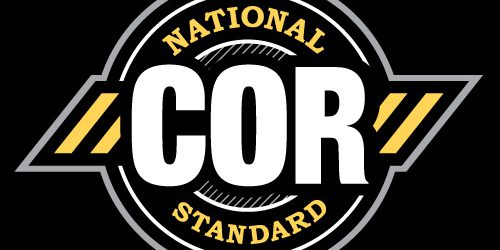COR – Certificate of Recognition
BACKGROUND
Nationally endorsed by the Canadian Federation of Construction Safety Associations (CFCSA) of which the IHSA is a member.
Designed as a Canada-wide certification program that gives companies a tool for assessing end enhancing their health & safety management.
ONTARIO PROGRAM
The Ontario program consists of 19 elements:
- Policy Statement
- Hazard Analysis
- Safe Work Practices (SWPs)
- Safe Job Procedures
- Company Rules
- PPE
- Preventative Maintenance
- Training and Communication
- Workplace Inspections
- Investigations and Reports
- Emergency Preparedness
- Statistics and Records
- Legislation
- Occupational Health
- First Aid
- Health & Safety Rep./ Joint H&S Committee
- Workplace Violence and Harassment
- Return to Work
- Management Review
TRAINING
Each company must designate 1 representative from senior management, as well as 1 designated full-time permanent employee who are to take the required training courses provided by the IHSA.
Sr. Management Rep: COR Essentials – ½ Day Course
Permanent Full-Time Employee[1]: COR Essentials – ½ Day Course
Basic Auditing Principles – Full Day
COR Internal Auditor – Full Day
Introduction to Hazards and Risk Management – Full Day
The Full-Time Permanent Employee becomes referred to as the Internal Auditor for the Company and is to work in correspondence with the IHSA Auditor or External Auditor.
AUDITING
Once the training is complete;
- The employer is required to conduct an internal audit of their health and safety management system using IHSA’s COR Audit Tool.
- The internal audit then gets reviewed by IHSA
- The COR Manager (IHSA) assigns the internal audit to an IHSA Auditor (External Auditor)
- The IHSA auditor will review and provide written feedback to the Employer within 60 days of receipt of the internal audit.
- Failure, by the Employer, to complete the COR™ Audit document as directed may result in the audit being returned for required corrections, additions or changes.
- If corrections are required, the Employer will be allowed up to 120 days to re-submit the corrected document.
- The external audit will be initiated if the internal audit meets requirements: meeting minimum score requirements for each element (65%) and the overall audit (80%) and the quality of evidence submitted.
- If the Employer does not pass the External Audit, IHSA will provide in writing the areas of improvement required.
- The Employer will have 120 days to provide confirmation that corrective actions have been implemented. A re-audit may be required.
DUTIES & RESPONSIBILITIES
IHSA:
- Managing COR Program Guidelines
- Designing and maintaining the programs used to train the internal auditor and senior management
- Reviewing and/or validating all audits submitted for the COR audit process
- Ensuring all COR audit standards and protocols are followed for the program
- Maintaining the COR information database
- Maintaining quality assurance of auditors and the audit process.
Employer/ Sr. Management Rep:
In addition to the prescribed training, Employers (Senior Management Representatives) have the following obligations:
- Notify IHSA immediately of any changes to company registration information
- Ensure audits are properly planned, scheduled and signed off by employer/senior management
- Provide access to facilities and supporting information as requested by IHSA.
- Actively participate in the COR audit process and maintain COR training requirements
- Provide the IHSA with feedback on the audit process to assist with continuous improvement
- Ensure maintenance of their COR status is achieved on an annual basis
- Designate a permanent full-time employee to act as internal auditor.
- If the designated senior management representative is no longer available, the employer is responsible for designating and training a new senior management representative and notifying IHSA in writing of the change
- If the internal auditor is no longer available, the employer is responsible for designating and training a new internal auditor and notifying IHSA in writing of the change.
Internal Auditor:
To qualify as an Internal Auditor, the employee appointed by the employer must be a permanent full-time employee of the organization and must complete specific IHSA training. The employee’s name and records of training must be submitted with the internal audit to IHSA for verification.
Responsibilities include but are not limited to:
- Administering and overseeing the organization’s COR program
- Completing and submitting the Employer’s COR Internal Audit and the supporting documentation
- Completing pre and post audit meetings
- Developing a written corrective action plan to ensure continuous improvement
- Providing additional audit information to the External Auditor if requested
- Act as the liaison person between the employer and IHSA for the COR program
- Compliance with COR program guidelines
External Auditor:
These services include but are not limited to:
- Reviewing an employer’s Internal Audit
- Communicating audit requirements to the employer
- Performing the COR audit
- Generating the audit report
- Maintaining confidentiality
Additional Comment: An IHSA employee who provides consulting services to a specific employer cannot be assigned to act as External Auditor to that employer. The External Auditor must declare a conflict of interest if circumstances arise between the auditor and the Employer (or their representative) which may be viewed as a conflict.
MOVING FORWARD
Once a workplace achieves COR, it is valid for three years from the date of certification, provided the employer performs internal maintenance audits in the second and third years and complies with the terms and conditions of the COR program
For more information regarding matters such as audit appeals, training exemptions, privacy of information, complaints or out-of-province reciprocity, please contact us today.
[1] Must be a full-time employee of the company being certified. Cannot, under any circumstances, be a third-party representative.







